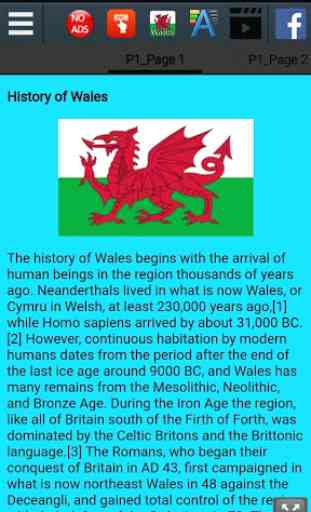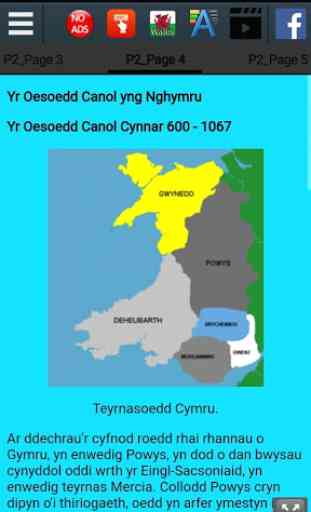History of Wales
The history of Wales begins with the arrival of human beings in the region thousands of years ago. Neanderthals lived in what is now Wales, or Cymru in Welsh, at least 230,000 years ago,[1] while Homo sapiens arrived by about 31,000 BC.[2] However, continuous habitation by modern humans dates from the period after the end of the last ice age around 9000 BC, and Wales has many remains from the Mesolithic, Neolithic, and Bronze Age. During the Iron Age the region, like all of Britain south of the Firth of Forth, was dominated by the Celtic Britons and the Brittonic language.[3] The Romans, who began their conquest of Britain in AD 43, first campaigned in what is now northeast Wales in 48 against the Deceangli, and gained total control of the region with their defeat of the Ordovices in 79. The Romans departed from Britain in the 5th century, opening the door for the Anglo-Saxon invasion. Thereafter Brittonic language and culture began to splinter, and several distinct groups formed. The Welsh people were the largest of these groups, and are generally discussed independently of the other surviving Brittonic-speaking peoples after the 11th century.[3]
A number of kingdoms formed in present-day Wales in the post-Roman period. While the most powerful ruler was acknowledged as King of the Britons (later Tywysog Cymru: Leader or Prince of Wales), and some rulers extended their control over other Welsh territories and into western England, none were able to unite Wales for long. Internecine struggles and external pressure from the English and later, the Norman conquerors of England, led to the Welsh kingdoms coming gradually under the sway of the English crown. In 1282, the death of Llywelyn ap Gruffudd led to the conquest of the Principality of Wales by King Edward I of England; afterwards, the heir apparent to the English monarch has borne the title "Prince of Wales". The Welsh launched several revolts against English rule, the last significant one being that led by Owain Glyndŵr in the early 15th century. In the 16th century Henry VIII, himself of Welsh extraction as a great grandson of Owen Tudor, passed the Laws in Wales Acts aiming to fully incorporate Wales into the Kingdom of England. Under England's authority, Wales became part of the Kingdom of Great Britain in 1707 and then the United Kingdom in 1801. Yet, the Welsh retained their language and culture despite heavy English dominance. The publication of the extremely significant first complete Welsh translation of the Bible by William Morgan in 1588 greatly advanced the position of Welsh as a literary language.[4]
The 18th century saw the beginnings of two changes that would greatly affect Wales, the Welsh Methodist revival, which led the country to turn increasingly nonconformist in religion, and the Industrial Revolution. During the rise of the British Empire, 19th century Southeast Wales in particular experienced rapid industrialisation and a dramatic rise in population as a result of the explosion of the coal and iron industries.[5] Wales played a full and willing role in World War One. The industries of Empire in Wales declined in the 20th century with the end of the British Empire following the Second World War, while nationalist sentiment and interest in self-determination rose. The Labour Party replaced the Liberal Party as the dominant political force in the 1940s. Wales played a considerable role during World War Two along with the rest of the United Kingdom of Great Britain and Northern Ireland and the Allies, and its cities were bombed extensively during the Nazi Blitz. The nationalist party Plaid Cymru gained short lived momentum in the 1960s. In a 1997 referendum Welsh voters approved the devolution of governmental responsibility to a National Assembly for Wales, which first met in 1999.
A number of kingdoms formed in present-day Wales in the post-Roman period. While the most powerful ruler was acknowledged as King of the Britons (later Tywysog Cymru: Leader or Prince of Wales), and some rulers extended their control over other Welsh territories and into western England, none were able to unite Wales for long. Internecine struggles and external pressure from the English and later, the Norman conquerors of England, led to the Welsh kingdoms coming gradually under the sway of the English crown. In 1282, the death of Llywelyn ap Gruffudd led to the conquest of the Principality of Wales by King Edward I of England; afterwards, the heir apparent to the English monarch has borne the title "Prince of Wales". The Welsh launched several revolts against English rule, the last significant one being that led by Owain Glyndŵr in the early 15th century. In the 16th century Henry VIII, himself of Welsh extraction as a great grandson of Owen Tudor, passed the Laws in Wales Acts aiming to fully incorporate Wales into the Kingdom of England. Under England's authority, Wales became part of the Kingdom of Great Britain in 1707 and then the United Kingdom in 1801. Yet, the Welsh retained their language and culture despite heavy English dominance. The publication of the extremely significant first complete Welsh translation of the Bible by William Morgan in 1588 greatly advanced the position of Welsh as a literary language.[4]
The 18th century saw the beginnings of two changes that would greatly affect Wales, the Welsh Methodist revival, which led the country to turn increasingly nonconformist in religion, and the Industrial Revolution. During the rise of the British Empire, 19th century Southeast Wales in particular experienced rapid industrialisation and a dramatic rise in population as a result of the explosion of the coal and iron industries.[5] Wales played a full and willing role in World War One. The industries of Empire in Wales declined in the 20th century with the end of the British Empire following the Second World War, while nationalist sentiment and interest in self-determination rose. The Labour Party replaced the Liberal Party as the dominant political force in the 1940s. Wales played a considerable role during World War Two along with the rest of the United Kingdom of Great Britain and Northern Ireland and the Allies, and its cities were bombed extensively during the Nazi Blitz. The nationalist party Plaid Cymru gained short lived momentum in the 1960s. In a 1997 referendum Welsh voters approved the devolution of governmental responsibility to a National Assembly for Wales, which first met in 1999.
Category : Books & Reference

Related searches
Reviews (6)
Ber. T.
Feb 16, 2022
Good historical information
Mik. K.
Jun 18, 2019
solid history of Wales app
HH. K. H. H. K. O. S.
Dec 1, 2021
HH KOS HIS HIGHNESS KING OF SCOTS DECLARE WAR WALES WAR WALES HH KOS HIS HIGHNESS KING OF SCOTS
Abd. J. R. S.
Feb 3, 2021
This is Rosmawe
A. G. u.
Nov 20, 2018
It.is.very.good.thank.you.





Everything Welsh is good. But you need too ad so much more